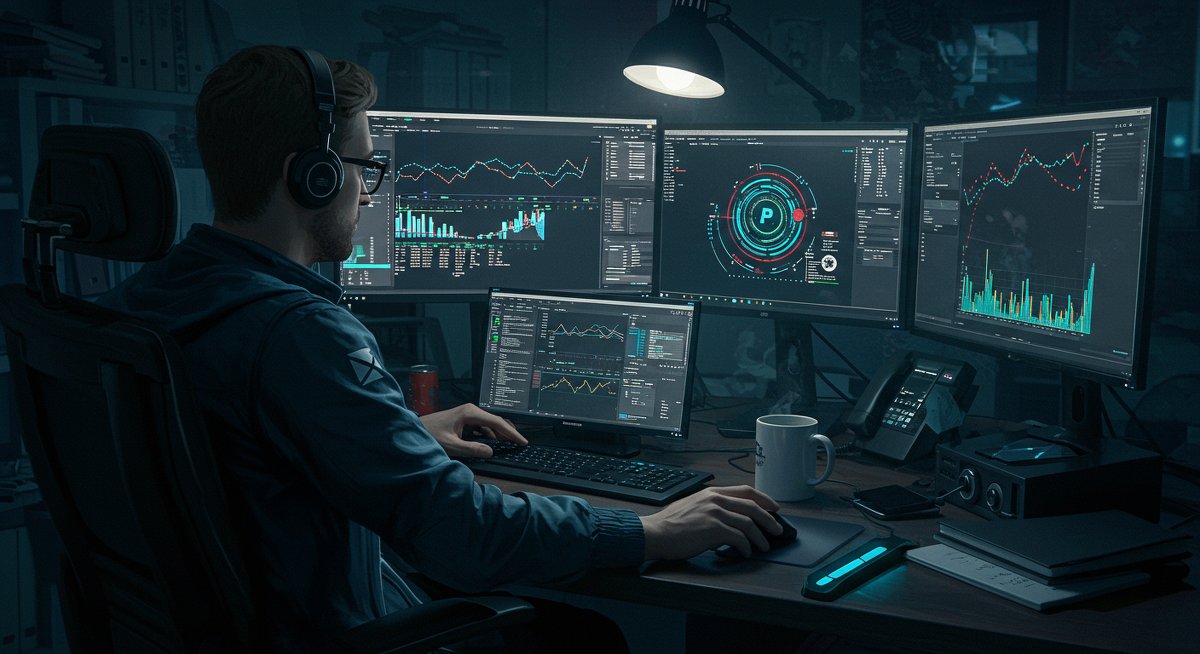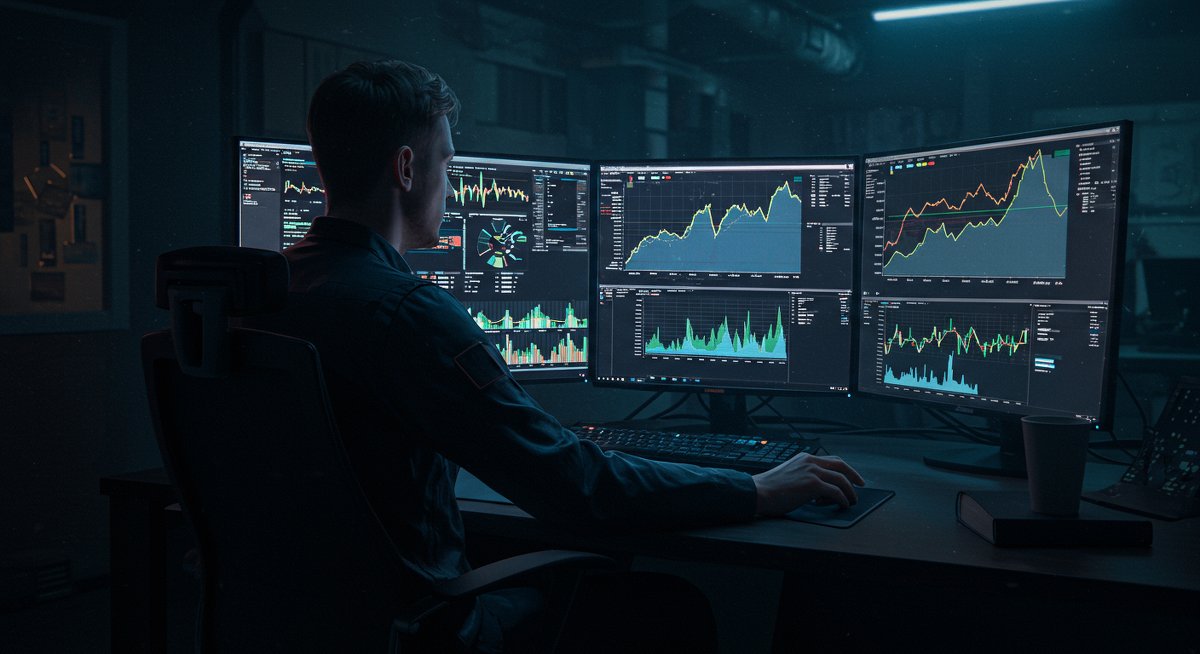Why This Got My Attention
So, I was scrolling through r/CryptoMarkets the other day, and I came across this AMA (Ask Me Anything) with someone claiming to be a crypto fraud investigator. You know how it is – you see those titles, and you're immediately a little skeptical. But this one caught my eye because the person seemed legit and was diving into some pretty dark corners of the crypto world. They were talking about everything from dark web activity to insider trading, rug pulls, and those terrifying drainer scams.
Honestly, it was a bit of a rabbit hole, but a fascinating one. What really grabbed me was the sheer volume of questions and the types of concerns people had. It wasn't just about the big scams you read about in the news; it was about the everyday threats that traders face, especially those of us operating outside the US, where regulations can be a bit murkier. This person was offering advice and dropping knowledge bombs and I couldn't help but want to dive deeper.
The fact that this investigator was willing to share their insights so openly on Reddit speaks volumes. It tells you that crypto fraud isn't some abstract concept; it's a real and present danger, and we all need to be more aware. It also highlights the importance of community in the crypto space – people helping each other navigate these treacherous waters. So, I decided to break down some of the key takeaways from the AMA, focusing on what international crypto traders need to know to protect themselves.

Decoding the Investigator's Insights
The fraud investigator in the Reddit AMA highlighted several key areas of concern. One of the most frequent questions revolved around rug pulls. For those who aren't familiar, a rug pull is when a crypto project team hypes up a new coin or token, attracts investors, and then suddenly disappears with all the funds. It's like pulling the rug out from under everyone, leaving them with worthless assets. The investigator emphasized that new projects are often the riskiest. They might promise huge returns, but they also have a higher chance of being scams.
Another big topic was drainer scams. These are particularly nasty because they involve tricking users into signing malicious smart contracts that drain their wallets. The investigator warned about clicking on suspicious links or connecting your wallet to unknown websites. Even experienced traders can fall victim to these scams if they're not careful. Always double-check the website address and be wary of any requests to sign transactions that seem unusual.
Insider trading also came up, which isn't surprising. While it's harder to detect in the crypto world compared to traditional finance, it definitely happens. The investigator talked about cases where individuals with access to privileged information (like upcoming exchange listings) use that knowledge to make profitable trades before the public finds out. This kind of activity is obviously illegal, but it's tough to prove without solid evidence. The investigator mentioned some strategies they use to try and track this activity which really opened my eyes to how shady the space can be.
What This Means for Your Trading
So, how does all this apply to you, especially if you're trading crypto from outside the United States? Well, the first thing to realize is that you might be even more vulnerable to scams and fraud. Why? Because regulations in many countries are still catching up with the rapidly evolving crypto landscape. This means there might be less legal recourse if you fall victim to a scam. Unlike the US with the SEC, many countries have little to no regulatory protection for crypto investors.
That said, there are proactive steps you can take to protect yourself. First and foremost, do your own research. Don't just blindly invest in a project because someone on social media is hyping it up. Read the whitepaper, check out the team behind the project, and look for any red flags. Use platforms like KuCoin or Changelly to research different projects. If something seems too good to be true, it probably is.
Another crucial point is to secure your crypto wallets. Use strong, unique passwords and enable two-factor authentication (2FA) whenever possible. Consider using a hardware wallet for your long-term holdings. A hardware wallet is a physical device that stores your private keys offline, making it much harder for hackers to access your funds. Be extra cautious about phishing scams. Never click on links in emails or messages that ask you to enter your private keys or seed phrase. Always go directly to the website or app you want to use. And if you're ever unsure about something, don't hesitate to ask for help from the crypto community. There are plenty of reputable forums and groups where you can get advice and support.
The Stuff Nobody Talks About
Let's talk about the stuff nobody really wants to hear: the psychological aspect of crypto trading and how it makes you vulnerable to scams. The investigator touched on this in the AMA, and it's something I've seen firsthand. When people get greedy or desperate, they tend to make bad decisions. They chase after quick profits, ignore red flags, and fall prey to emotional manipulation.
Think about it: How many times have you seen people FOMO (fear of missing out) into a project just because the price is skyrocketing? Or how many times have you held onto a losing investment for too long, hoping it will eventually bounce back? These emotional biases can cloud your judgment and make you more susceptible to scams. Scammers know this, and they exploit it. They create a sense of urgency, promise guaranteed returns, and pressure you to act fast. They prey on your greed and your fear.
That's why it's so important to stay grounded and rational when trading crypto. Develop a solid trading plan, stick to your risk management rules, and don't let your emotions dictate your decisions. If you find yourself getting too caught up in the hype, take a break. Step away from the charts, clear your head, and come back with a fresh perspective. It's also helpful to talk to other traders or mentors who can offer objective advice. Remember, slow and steady wins the race. Don't try to get rich overnight, and always prioritize your financial security.
If You're Trading from Outside the US
Trading crypto from outside the US adds another layer of complexity. Regulations vary widely from country to country, and what's legal in one jurisdiction might be illegal in another. Before you start trading, it's crucial to understand the local laws and tax implications. Some countries have strict rules about crypto exchanges, while others have outright banned certain activities. Failing to comply with these regulations can result in fines, penalties, or even legal action.
Another thing to consider is currency exchange rates and fees. When you're trading crypto in a foreign currency, you'll need to convert your funds, which can incur additional costs. Make sure you factor these costs into your trading strategy. Also, be aware of the potential for currency fluctuations. If the value of your local currency drops against the US dollar or other major currencies, it can impact your profits.
Finally, be extra cautious about scams and fraud. As mentioned earlier, regulatory oversight might be weaker in your country, making you more vulnerable. Stick to reputable exchanges and platforms, and be wary of any unsolicited offers or investment opportunities. Do your own due diligence, and never invest more than you can afford to lose. If you're unsure about something, seek advice from a qualified financial advisor or legal professional.

Actually Doing This Stuff
Okay, so how do you actually put all this into practice? Let's break it down into actionable steps.
Step 1: Research and Due Diligence:
Before you invest in any cryptocurrency, take the time to research the project thoroughly. Read the whitepaper, check out the team behind the project, and assess its potential use cases. Look for any red flags, such as unrealistic promises, lack of transparency, or a history of scams. Use platforms like CoinMarketCap and CoinGecko to gather information and track the performance of different cryptocurrencies.
Step 2: Secure Your Wallets:
Use strong, unique passwords for all your crypto accounts. Enable two-factor authentication (2FA) whenever possible. Consider using a hardware wallet for your long-term holdings. Be extra cautious about phishing scams. Never click on links in emails or messages that ask you to enter your private keys or seed phrase. Always go directly to the website or app you want to use.
Step 3: Develop a Trading Plan:
Create a written trading plan that outlines your goals, risk tolerance, and investment strategy. Determine how much capital you're willing to allocate to crypto trading, and set clear stop-loss orders to limit your potential losses. Stick to your plan, and don't let your emotions dictate your decisions.
Step 4: Stay Informed:
Keep up-to-date with the latest news and trends in the crypto market. Follow reputable news sources, attend industry events, and participate in online communities. Be aware of potential scams and fraud, and always be skeptical of any unsolicited offers or investment opportunities. The more you know, the better equipped you'll be to make informed decisions and protect your assets.
My Take on All This
Here's the thing: Crypto trading can be incredibly rewarding, but it's also incredibly risky. It's not a get-rich-quick scheme, and it's not for the faint of heart. It requires discipline, patience, and a willingness to learn. The Reddit AMA with the crypto fraud investigator served as a stark reminder of the dangers that lurk in this space, but it also offered valuable insights into how to protect yourself.
Ultimately, the best defense against crypto fraud is knowledge. The more you know about the different types of scams, the better equipped you'll be to spot them. The more you understand about risk management, the better you'll be able to protect your capital. And the more you engage with the crypto community, the more support and guidance you'll receive.
So, if you're serious about crypto trading, take the time to educate yourself, secure your assets, and stay informed. Don't let greed or fear cloud your judgment, and always prioritize your financial security. The crypto market is constantly evolving, so you need to be adaptable and willing to learn. It can be a wild ride, but with the right mindset and strategies, you can navigate the challenges and reap the rewards.